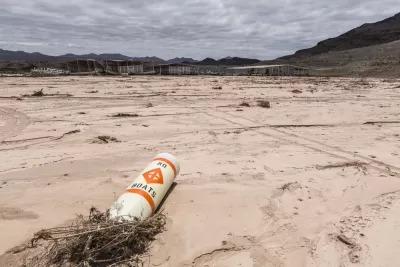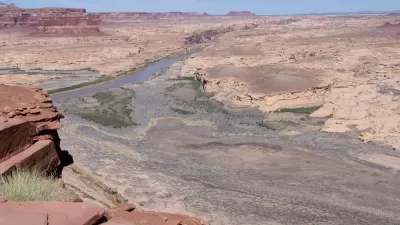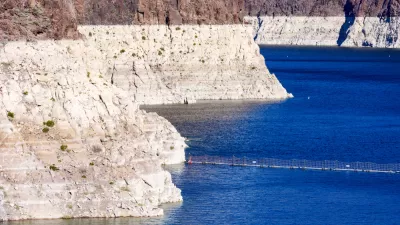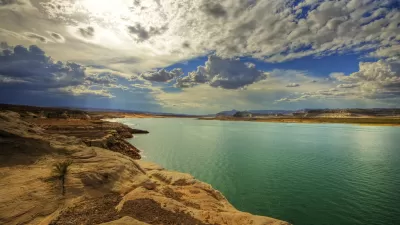The first-of-its-kind declaration triggers major water cutbacks for Arizona farmers and reduced allocations for Nevada and Mexico.

With water in Lake Mead at a critically low level – the lowest in the reservoir's nearly hundred-year history – the U.S. Bureau of Reclamation has declared a water shortage, triggering "mandatory cutbacks next year that will bring major challenges for Arizona farmers and reduce the water allotments of Nevada and Mexico." As reported by Ian James and Zayna Syed, the declaration "has been anticipated for months and was triggered by the spiraling decline of Lake Mead, which stores water used by Arizona, Nevada, California and Mexico." In particular, "[f]armers in part of central Arizona will face major cutbacks in water deliveries next year, and they’re preparing for the supplies to be entirely shut off in 2023."
"The reductions are taking effect under a 2019 agreement called the Drought Contingency Plan, which was aimed at reducing the risks of Lake Mead falling to critical lows. But as extreme heat and unrelenting drought have persisted across much of the watershed, the levels of the Colorado’s largest reservoirs have fallen faster than had been expected." The river "provides water for cities, tribal nations and about 4.5 million acres of farmland from Wyoming to the U.S.-Mexico border. About 70% of the water diverted from the river in the U.S. is used for agriculture, flowing to fields of hay and cotton, fruit orchards and farms that produce much of the country’s winter vegetables."
But the Colorado's water "has long been chronically overallocated under the 1922 Colorado River Compact and subsequent agreements, with more water promised on paper than what the river can supply in an average year." J.B. Hamby, vice president of California's Imperial Irrigation District, which holds the largest single water entitlement on the river, said "everyone needs to recognize the Colorado River is now in 'an era of limits' that requires everyone along the river to understand that water use must be limited," while some conservationists "have long called for the government to drain Lake Powell at Glen Canyon Dam and instead store the water downstream in a single reservoir at Lake Mead." The new federal infrastructure bill "includes money to improve so-called natural infrastructure, including forests, watersheds and underground aquifers, which could help bolster the supply, or at least slow the decline" of water supplies in the region.
FULL STORY: First-ever water shortage on the Colorado River will bring cuts for Arizona farmers

Alabama: Trump Terminates Settlements for Black Communities Harmed By Raw Sewage
Trump deemed the landmark civil rights agreement “illegal DEI and environmental justice policy.”

Study: Maui’s Plan to Convert Vacation Rentals to Long-Term Housing Could Cause Nearly $1 Billion Economic Loss
The plan would reduce visitor accommodation by 25% resulting in 1,900 jobs lost.

Planetizen Federal Action Tracker
A weekly monitor of how Trump’s orders and actions are impacting planners and planning in America.

Wind Energy on the Rise Despite Federal Policy Reversal
The Trump administration is revoking federal support for renewable energy, but demand for new projects continues unabated.

Passengers Flock to Caltrain After Electrification
The new electric trains are running faster and more reliably, leading to strong ridership growth on the Bay Area rail system.

Texas Churches Rally Behind ‘Yes in God’s Back Yard’ Legislation
Religious leaders want the state to reduce zoning regulations to streamline leasing church-owned land to housing developers.
Urban Design for Planners 1: Software Tools
This six-course series explores essential urban design concepts using open source software and equips planners with the tools they need to participate fully in the urban design process.
Planning for Universal Design
Learn the tools for implementing Universal Design in planning regulations.
Caltrans
Smith Gee Studio
Institute for Housing and Urban Development Studies (IHS)
City of Grandview
Harvard GSD Executive Education
Toledo-Lucas County Plan Commissions
Salt Lake City
NYU Wagner Graduate School of Public Service





























